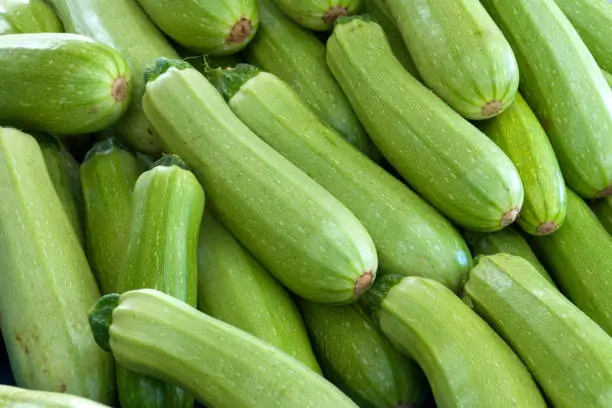Zucchini, also known as courgette in some parts of the world, is a popular summer squash celebrated for its versatility in the kitchen and its impressive nutritional value.
With its mild flavor and tender texture, zucchini is a beloved ingredient in various culinary dishes.
In this article, we’ll explore the history, nutritional benefits, health advantages, and diverse culinary uses of zucchini.
Table of Contents
History

Zucchini, scientifically known as Cucurbita pepo, belongs to the gourd family and is believed to have originated in the Americas, particularly in regions that are now part of Mexico and Central America.
This squash was cultivated by indigenous peoples for centuries before the arrival of European settlers in the Americas.
The name “zucchini” is derived from the Italian “zucchini,” which means “small squash.” The squash made its way to Europe, where it was eventually embraced as a versatile and flavorful addition to various culinary dishes.
In the United States, zucchini gained popularity in the mid-20th century, and today, it is widely cultivated and enjoyed around the world.
Nutritional Value
Zucchini is celebrated for its low-calorie content and impressive nutritional profile. It’s rich in vitamins, minerals, dietary fiber, and antioxidants. Here’s a breakdown of its nutritional content:
1. Vitamins:
Courgette is a good source of vitamin C, an essential antioxidant that supports the immune system and helps the body absorb iron. It also contains moderate amounts of B vitamins, particularly B6, riboflavin (B2), and folate.
2. Minerals:
provides important minerals, including potassium, which plays a crucial role in regulating blood pressure, and small amounts of magnesium, phosphorus, and calcium.
3. Dietary Fiber:
It is a fiber-rich vegetable, that supports digestive health, aids in weight management, and helps regulate blood sugar levels.
4. Antioxidants:
offers various antioxidants, such as lutein and zeaxanthin, which are beneficial for eye health, and carotenoids, which help protect the body from oxidative stress and reduce the risk of chronic diseases.
Health Benefits of Zucchini
1. Weight Management:
is low in calories and high in dietary fiber, making it an excellent choice for those looking to manage their weight. The fiber content promotes satiety and helps control appetite.
2. Digestive Health:
The dietary fiber supports healthy digestion by aiding regular bowel movements and preventing constipation.
3. Heart Health:
The potassium helps regulate blood pressure and maintain proper heart function. The antioxidants also contribute to heart health by reducing inflammation.
4. Eye Health:
The lutein and zeaxanthin play a significant role in maintaining healthy eyes. These carotenoids help protect the eyes from damage caused by UV rays and reduce the risk of age-related macular degeneration.
5. Antioxidant Properties:
The antioxidants help protect cells from oxidative stress and reduce the risk of chronic diseases.
Culinary Uses
versatility in the kitchen makes it a favorite ingredient in various culinary applications. Here are some popular ways to enjoy zucchini:
1. Sautéed Zucchini:
Sautéing zucchini in olive oil with garlic, herbs, and spices creates a flavorful and tender side dish.
2. Grilled:
Grilled develops a smoky flavor and appealing grill marks. It can be served as a side dish or used in sandwiches and salads.
3. Noodles (Zoodles):
Spiralized can be used as a low-carb alternative to pasta in dishes like “zoodle” spaghetti or stir-fries.
4. Stuffed:
Hollowed-out can be stuffed with various fillings, such as ground meat, rice, vegetables, and cheese, then baked to perfection.
5. Bread:
bread is a sweet and moist baked treat that incorporates grated zucchini, adding both flavor and moisture to the recipe.
6. Fritters:
Grated can be mixed with flour, eggs, and seasonings to create zucchini fritters that are crispy on the outside and tender on the inside.
7. Soup:
soup, often combined with other vegetables and seasonings, is a soothing and nutritious dish.
8. Ratatouille:
is a key ingredient in the traditional French dish ratatouille, which also includes eggplant, tomatoes, and bell peppers.
Cultural Significance
plays a role in various global cuisines:
1. Italian Cuisine:
is commonly used in Italian dishes such as pasta primavera, where it is combined with fresh vegetables and pasta.
2. Mediterranean Cuisine:
In Mediterranean cuisine, is used in dishes like moussaka and vegetable tians.
3. Mexican Cuisine:
In Mexican cuisine, is used in dishes like calabacitas, which are typically sautéed with corn, tomatoes, and chili peppers.
Cautions and Considerations
While is generally considered safe and nutritious, it’s important to consider the potential for allergies or sensitivities.
Some individuals may experience digestive discomfort or skin reactions when consuming. If you suspect sensitivity, consult a healthcare professional for guidance.
Conclusion
with its mild flavor and impressive nutritional value, is a versatile and nutritious addition to a balanced diet.
From aiding in weight management to promoting digestive health and heart well-being, zucchini offers a wide range of health benefits.
Whether you enjoy it as a sautéed side dish, spiralized into “zoodles,” or incorporated into various culinary creations, zucchini can elevate your meals and contribute to a healthier, more nutritious lifestyle.
So, embrace the versatility of savor its mild and tender texture, and celebrate its role as a versatile and nutrient-packed summer squash.